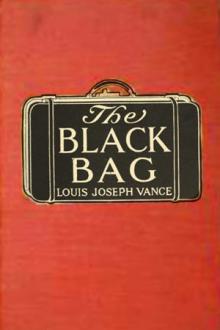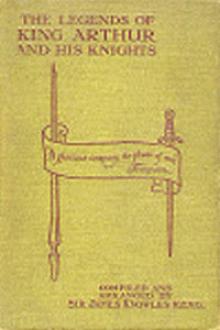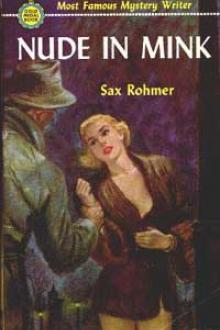The Bandbox by Louis Joseph Vance (read novels website .txt) 📕

- Author: Louis Joseph Vance
- Performer: -
Book online «The Bandbox by Louis Joseph Vance (read novels website .txt) 📕». Author Louis Joseph Vance
“Hello!” he said crisply.
“Afternoon,” returned Staff with all the morose dignity appropriate to severely wounded self-esteem.
Iff indicated the bandbox with a delicate gesture.
“No wonder,” he observed mildly, “you wanted the ship to yourself.”
Staff grunted irritably and, picking his way through and over the mound of luggage, deposited himself on the transom opposite the berths.
“A present for the missis, I take it?” pursued Iff.
“You might take it, and welcome, for all of me.... Only it isn’t mine. And I am not married.”
“Pardon!” murmured Mr. Iff. “But if it isn’t yours,” he suggested logically, “what the deuce-and-all is it doing here?”
“I’m supposed to be taking it home for a friend.”
“Ah! I see.... A very, very dear friend, of course....?”
“You’d think so, wouldn’t you?” Staff regarded the bandbox with open malevolence. “If I had my way,” he said vindictively, “I’d lift it a kick over the side and be rid of it.”
“How you do take on, to be sure,” Iff commented placidly. “If I may be permitted to voice my inmost thought: you seem uncommon’ peeved.”
“I am.”
“Could I soothe your vexed soul in any way?”
“You might tell me how to get quit of the blasted thing.”
“I’ll try, if you’ll tell me how you got hold of it.”
“Look here!” Staff suddenly aroused to a perception of the fact that he was by way of being artfully pumped. “Does this matter interest you very much indeed?”
“No more, apparently, than it annoys you.... And it is quite possible that, in the course of time, we might like to shut the door.... But, as far as that is, I don’t mind admitting I’m a nosey little beast. If you feel it your duty to snub me, my dear fellow, by all means go to it. I don’t mind—and I dessay I deserve it.”
This proved irresistible; Staff’s humour saved his temper. To the twinkle in Iff’s faded blue eyes he returned a reluctant smile that ended in open laughter.
“It’s just this way,” he explained somewhat to his own surprise, under the influence of an unforeseen gush of liking for this good-humoured wisp of a man—“I feel I’m being shamelessly imposed upon. Just as I was leaving my rooms this morning this hat-box was sent to me, anonymously. I assume that some cheeky girl I know has sent it to me to tote home for her. It’s a certificated nuisance—but that isn’t all. There happens to be a young woman named Searle on board, who has an exact duplicate of this infernal contraption. A few moments ago I saw it, assumed it must be mine, quite naturally claimed it, and was properly called down in the politest, most crushing way imaginable. Hence this headache.”
“So!” said Mr. Iff. “So that is why he doesn’t love his dear little bandbox!... A Miss Earle, I think you said?”
“No—Searle. At least, that was the name on her luggage.”
“Oh—Searle, eh?”
“You don’t happen to know her, by any chance?” Staff demanded, not without a trace of animation.
“Who? Me? Nothing like that,” Iff disclaimed hastily.
“I just thought you might,” said Staff, disappointed.
For some moments the conversation languished. Then Staff rose and pressed the call-button.
“What’s up?” asked Iff.
“Going to get rid of this,” said Staff with an air of grim determination.
“Just what I was going to suggest. But don’t do anything hasty—anything you’ll be sorry for.”
“Leave that to me, please.”
From his tone the assumption was not unwarrantable that Staff had never yet done anything that he had subsequently found cause to regret. Pensively punishing an inoffensive wrist, Iff subsided.
A steward showed himself in the doorway.
“You rang, sir?”
“Are you our steward?” asked Staff.
“Yes, sir.”
“Your name?”
“Orde, sir.”
“Well, Orde, can you stow this thing some place out of our way?”
Orde eyed the bandbox doubtfully. “I dessay I can find a plice for it,” he said at length.
“Do, please.”
“Very good, sir. Then-Q.” Possessing himself of the bandbox, Orde retired.
“And now,” suggested Iff with much vivacity, “s’pose we unpack and get settled.”
And they proceeded to distribute their belongings, sharing the meagre conveniences of their quarters with the impartiality of courteous and experienced travellers....
It was rather late in the afternoon before Staff found an opportunity to get on deck for the first time. The hour was golden with the glory of a westering sun. The air was bland, the sea quiet. The Autocratic had settled into her stride, bearing swiftly down St. George’s Channel for Queenstown, where she was scheduled to touch at midnight. Her decks presented scenes of animation familiar to the eyes of a weathered voyager.
There was the customary confusion of petticoats and sporadic displays of steamer-rugs along the ranks of deck-chairs. Deck-stewards darted hither and yon, wearing the harassed expressions appropriate to persons of their calling—doubtless to a man praying for that bright day when some public benefactor should invent a steamship having at least two leeward sides. A clatter of tongues assailed the ear, the high, sweet accents of American women predominating. The masculine element of the passenger-list with singular unanimity—like birds of prey wheeling in ever diminishing circles above their quarry—drifted imperceptibly but steadily aft, toward the smoking-room. The two indispensable adjuncts to a successful voyage had already put in their appearance: item, the Pest, an overdressed, overgrown, shrill-voiced female-child, blundering into everybody’s way and shrieking impertinences; item, a short, stout, sedulously hilarious gentleman who oozed public-spirited geniality at every pore and insisted on buttonholing inoffensive strangers and demanding that they enter an embryonic deck-quoit tournament—in short, discovering every known symptom of being the Life and Soul of the Ship.
Staff dodged both by grace of discretion and good fortune, and having found his deck-chair, dropped into it with a sigh of content, composing himself for rest and thought. His world seemed very bright with promise, just then; he felt that, if he had acted on impetuous impulse, he had not acted unwisely: only a few more hours—then the pause at Queenstown—then the brief, seven-day stretch across the Atlantic to home and Alison Landis!
It seemed almost too good to be true. He all but purred with his content in the prospect.
Of course, he had a little work to do, but he didn’t mind that; it would help immensely to beguile the tedium of the voyage; and all he required in order to do it well was the moral courage to shut himself up for a few hours each day and to avoid as far as possible social entanglements....
At just about this stage in his meditations he was somewhat rudely brought back to earth—or, more properly, to deck.
A voice shrieked excitedly: “Why, Mr. Staff!”
To be precise, it miscalled him “Stahf”: a shrill, penetrating, overcultivated, American voice making an attempt only semi-successful to cope with the broad vowels of modern English enunciation.
Staff looked up, recognised its owner, and said beneath his breath: “O Lord!”—his soul crawling with recognition. But nothing of this was discernible in the alacrity with which he jumped up and bent over a bony but bedizened hand.
“Mrs. Ilkington!” he said.
“R’ally,” said the lady, “the world is ve-ry small, isn’t it?”
She was a lean, angular, inordinately vivacious body whose years, which were many more than forty, were making a brave struggle to masquerade as thirty. She was notorious for her execrable taste in gowns and jewelry, but her social position was impregnable, and her avowed mission in life was to bring together Society (meaning the caste of money) with the Arts (meaning those humble souls content to sell their dreams for the wherewithal to sustain life).
Her passion for bromidioms always stupefied Staff—left him dazed and witless. In the present instance he could think of nothing by way of response happier than that hoary banality: “This is indeed a surprise.”
“Flatterer!” said Mrs. Ilkington archly. “I’m not surprised,” she pursued. “I might have known you’d be aboard this vessel.”
“You must be a prophetess of sorts, then,” he said, smiling. “I didn’t know I was going to sail, myself, till late yesterday afternoon.”
“Deceiver,” commented the lady calmly. “Why can’t you men ever be candid?”
Surprise merged into some annoyance. “What do you mean?” he asked bluntly.
“Oh, but two can play at that game,” she assured him spiritedly. “If you won’t be open with me, why should I tell all I know?”
“I’m sure I don’t know what you’re driving at, Mrs. Ilkington.”
“Would it improve your understanding”—she threatened him gaily with a gem-encrusted forefinger—“if I were to tell you I met a certain person in Paris last week, who talked to me about you?”
“It would not,” said he stiffly. “Who—?”
“Oh, well, if you won’t be frank!” Mrs. Ilkington’s manner implied that he was a bold, bad butterfly, but that she had his entomological number, none the less. “Tell me,” she changed the subject abruptly, “how goes the great play?”
“Three acts are written,” he said in weariness of spirit, “the fourth—”
“But I thought you weren’t to return to America until it was quite finished?”
“Who told you that, please?”
“Never mind, sir! How about the fourth act?”
“I mean to write it en voyage,” said he, perplexed. From whom could this woman possibly have learned so much that was intimate to himself?
“You have it all mapped out, then?” she persisted.
“Oh, yes; it only needs to be put on paper.”
“R’ally, then, it’s true—isn’t it—that the writing is the least part of play construction?”
“Who told you that?” he asked again, this time amused.
“Oh, a very prominent man,” she declared; and named him.
Staff laughed. “A too implicit belief in that theory, Mrs. Ilkington,” said he, “is responsible for the large number of perfectly good plays that somehow never get written—to say nothing of the equally large number of perfectly good playwrights who somehow never get anywhere.”
“Clever!” screamed the lady. “But aren’t you wasteful of your epigrams?”
He could cheerfully have slain her then and there; for which reason the civil gravity he preserved was all the more commendable.
“And now,” he persisted, “won’t you tell me with whom you were discussing me in Paris?”
She shook her head at him reprovingly. “You don’t know?”
“No.”
“You can’t guess?”
“Not to save me.”
“R’ally?”
“Honestly and truly,” he swore, puzzled by the undertone of light malice he thought to detect in her manner.
“Then,” said she with decision, “I’m not going to get myself into trouble by babbling. But, if you promise to be nice to me all the way home—?” She paused.
“I promise,” he said gravely.
“Then—if you happen to be at the head of the companion-ladder when the tender comes off from Queenstown tonight—I promise you a huge surprise.”
“You won’t say more than that?” he pleaded.
She appeared to debate. “Yes,” she announced mischievously; “I’ll give you a leading hint. The person I mean is the purchaser of the Cadogan collar.”
His eyes were blank. “And what, please, is the Cadogan collar?”
“You don’t mean to tell me you’ve never heard of it?” She paused with dramatic effect. “Incredible! Surely, everybody knows about the Cadogan collar, the most magnificent necklace of pearls in the world!”
“Everybody, it seems, but myself, Mrs. Ilkington.”
“R’ally!” she cried, and tapped his arm playfully. “You are as stupid as most brilliant men!”
A bugle sang through the evening air. The lady started consciously.
“Heavens!” she cried. “Time to dress for dinner: I must fly!... Have you made your table reservation yet?”
“Yes,” he said hastily.
“Then do see the second-steward at once and get transferred to our table; we have just one vacant chair. Oh, but you must; you’ve promised to be nice to me, you know. And I do so want you to meet one of my protégées—such a sweet girl—a Miss Searle. I’m sure





Comments (0)